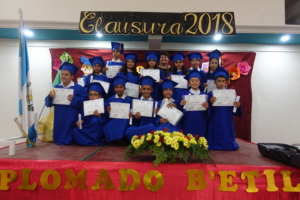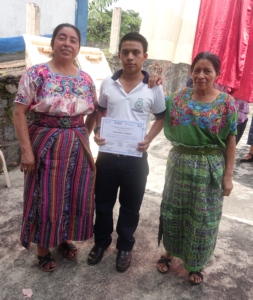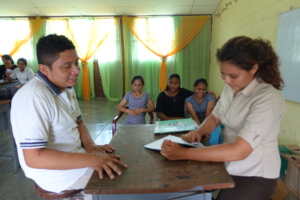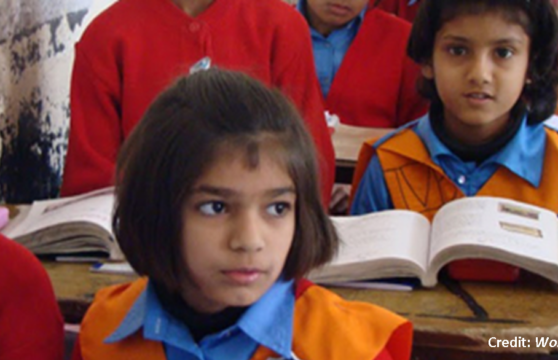How Important is Chinese Lending to Latin America?
Chinese lending to Latin America and the Caribbean hit an all-time high of $37 billion in 2010.
Education is crucial for economic development. However, according to data from the Guatemalan Ministry of Education, less than half of primary and secondary school students reach national standards in basic areas such as math and reading, reflecting weaknesses in the quality of education available to children and youth. Limited access to quality education hampers access to better jobs. As a result, this can lead youth to migrate, seeking better economic opportunities elsewhere.

The challenge of limited educational and economic opportunities for youth in Guatemala is very serious. In this context, and with the aim of improving the academic performance of youth in Guatemala, the Opportunities for My Community Project works with partners to offer the B’etil[1] Diploma for Professional Skills, an extracurricular education program focused on mathematics, communication and entrepreneurship skills. The project also engages nontraditional stakeholders, including diaspora groups and remittance companies, in supporting this effort.
From local schools to diaspora members, the project has promoted efforts to support educational programs in communities of high emigration. Guatemalan diaspora groups and remittance companies have been fundamental in this task; the project has partnered with three diaspora groups based in the United States in order to bring the B’etil Diploma to their hometown, providing young people with additional educational opportunities that improve their quality of life.
Unidos por El Palmar was the first diaspora group to join the project in 2017. The organization supported three volunteer teachers in implementing the Diploma in the municipality of El Palmar, Quetzaltenango, during the 2017 and 2018 school years. Over 130 students participated in the program, which was also supported by community education authorities and school principals.

The president of Unidos por El Palmar commented that “These types of programs rarely come to our community, and that is why they are so important for students, who come from families of limited economic resources. For us it was a positive experience and we are very grateful for the opportunity that the project gave us to support the education of young people.”
Motivated by the excellent results of the first year in El Palmar, the diaspora group Asociación de Migrantes Catarinecos also requested support from the project to implement the B’etil Diploma in Santa Catarina Mita, Jutiapa for the 2018 academic year.
In this municipality, a volunteer teacher taught the Diploma to 14 sixth graders in a rural school. The teacher and the students received the full support of the parents, who also contributed with resources to pay for the graduation ceremony. The teacher said, “The parents are grateful for this opportunity, the kids now feel prepared to begin middle school because they learned new topics that they will put into practice in the near future.” In addition, the Municipal Supervisor from the Ministry of Education expressed her support for the Diploma on numerous occasions and attended the graduation.
In the case of Nueva Concepción municipality in Escuintla, the diaspora group Red Migrante worked with the remittance company Intermex under the project’s coordination to sponsor two teachers, who taught to over 400 students the B’etil Diploma. Additionally, Intermex supported the project with the implementation of an intensive summer course focused on developing entrepreneurial skills in this municipality, which included the participation of 50 youth.
The B’etil Diploma has had an especially positive impact in Nueva Concepción, preparing youth to take advantage of professional opportunities. The authorities of the partner school (INEMBO) noted that thanks to the Diploma, 20 per cent of graduating seniors got a job at the same place where they did their professional practice (a type of internship). This figure is double that of the previous year, when only 10 per cent of graduates were able to immediately find work. The professional skills they learned in the B’etil Diploma made an important difference, preparing them to successfully start their first job.
Thanks to all these partnerships, in these three municipalities, more than 500 students have completed the full 60 hours of the B’etil program, earning a special Diploma that recognizes their efforts. The Diploma has also the recognition of the Guatemalan Vice Minister of Technical Education.
The B’etil Diploma has proven to have a positive impact on the academic knowledge and performance of students in El Palmar, Santa Catarina and La Nueva Concepción. The “pre” and “post” exams carried out by the project in these three communities show that, on average, students improved their knowledge in math, communication and entrepreneurship by 34 per cent. This positive outcome helps prepare young people with the skills and knowledge they need to access professional opportunities at home in Guatemala, such that migration is not the only option they see.

In all cases, the project provides local teachers with the training, materials, and pedagogical support to implement the B’etil Diploma. Moreover, the project has shared the complete methodology of the Diploma which is easily replicable. Meanwhile, the diaspora groups have provided the coordination needed for the program’s implementation including arranging classroom space, promoting enrollment, and interacting with the local educational authorities.
With technical assistance from the project, new stakeholders, such as diaspora groups and remittance companies, have gotten engaged in supporting high quality education for youth in Guatemala. Both diaspora groups and remittance companies can contribute to better educational outcomes for Guatemala, playing an important role in strengthening the professional skills of youth.
Chinese lending to Latin America and the Caribbean hit an all-time high of $37 billion in 2010.
Venezuelan president Nicolas Maduro left China last month with a supposed show of support from the Chinese government.
Why Pakistan represents “the biggest education reform challenge” and 12 lessons that are applicable to reform efforts around the globe.

